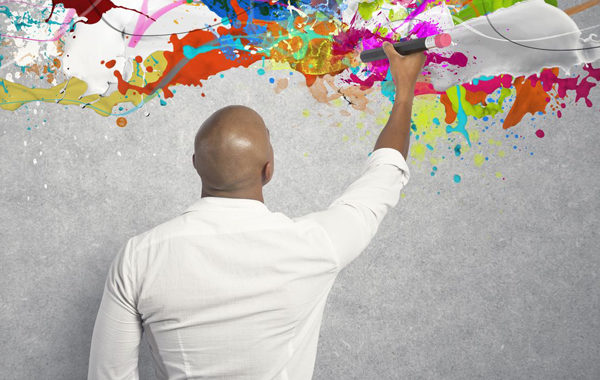By Arlene Seymour, MA, LCAT, CASAC
Director of Alcohol & Substance Use Treatment & Prevention Services at CoveCare Center
At CoveCare Center, we employ many proven methodologies to help both children and adults cope with mental health issues as well as substance use. Art therapy is one of many successful therapeutic interventions for coping with the challenges that life brings us. Key benefits that can be derived by our clients from art therapy are: self-discovery, personal fulfillment, empowerment, relaxation, and improved overall health–including physical, emotional and cognitive functioning, interpersonal skills and quality of life. Creating art increases serotonin in the brain, allowing our clients to feel more comfortable opening up about their feelings which in turn helps them to build self-worth and self-confidence.
Art therapy can also be useful in assessing mental health problems such as anxiety, depression, and post-traumatic stress disorder. Art is known to be a form of communication. For example, when asked to draw a certain scenario, the way a person responds can provide information about their internal emotional state and past experiences. In children, it is especially helpful because they are honest by nature. While it may be difficult for them to verbalize their feelings, children will depict them very clearly through their artwork, which in turn can enable our therapists to identify deeper issues and help our clients work through them.
Art therapy is also a successful tool for treatment of clients who are battling terminal illness, such as cancer. They fight a constant battle physically and emotionally, and the process of creating art is important in providing relief to these patients. When they may start to lose hope, art therapy pulls them back to optimism. When the client creates art, they are able to create their own world and they can make it be whatever they want it to be. Sometimes that is all someone needs to do to bring back confidence and the will to keep going.
When clients who are dealing with substance use issues are able to create art in a judgment free zone, they are able to build up their feelings of self-worth, self-confidence, self-discovery, and other feelings they had thought to be lost. Failure is a common feeling in someone who is struggling with addiction. They tend to have trouble with motivation and leave most of their life unfinished. It is a rewarding feeling for them to complete a piece of art. It brings back feelings of completeness and hope.
Clients are given a variety of art mediums. Their choice of medium is reflective of their emotional state. For example, a client who will only work in graphite pencil is demonstrating a strong need for control. Sometimes clients may use paint, and another time they may use colored pencils and markers or clay. We find that creating art helps our clients to open up and talk more about their feelings. Using more fluid art mediums, such as acrylic paint or tempura paint, brings out increased emotions and tends to deepen the experience of art therapy.
An important aspect of gauging the success of art therapy is through tracking progression. A clients’ artwork is saved from day one and throughout their therapy. By watching how their art changes over time, a therapist can observe changes in their clients’ mental status and assess the impact of their overall therapeutic plan. As feelings change, we might see things such as brighter colors or a change in the subject of the painting. It is especially rewarding for clients to see their own progression in their artwork.
Here at CoveCare Center, one way that we incorporate art therapy is in our Women’s Recovery Program. The group is made up of women who are in recovery from substance use dependency. In a group session, they are given a topic to address through the art medium being used. For example, they may be asked to depict what they lost in their addiction, or asked to illustrate the positives they see in their recovery. By doing art therapy exercises in a group environment, the clients not only gain insight into their own issues and recovery, but also make gains through positive social interaction, empathy and support from their peers.
Art therapy is clearly demonstrating itself to be a successful intervention in treating clients facing many different issues. When provided by a licensed Art Therapist or Creative Arts Therapist, it is one of many alternative modalities we at CoveCare utilize to help our clients achieve an overall improved quality of life and perception of wellness.
